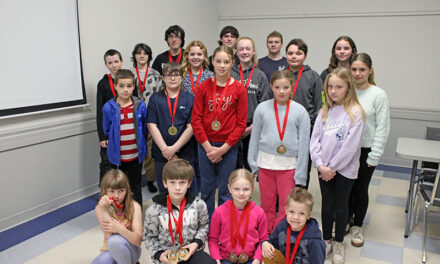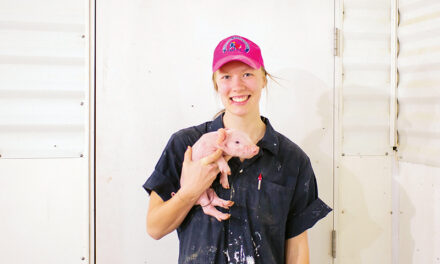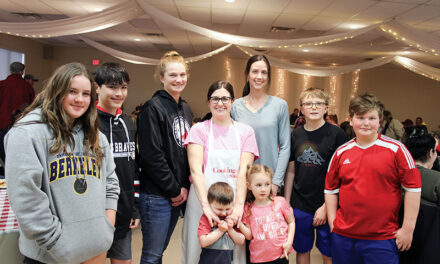Sandy Casselman
Record Staff
CORNWALL – The Cornwall and area Chamber of Commerce (COC) and YourTV Cornwall partnered to provide residents of Stormont, Dundas, and South Glengarry with an opportunity to hear from local member of parliament (MP) candidates prior to this month’s federal election.
“This election is going to be for future generations. Future generations that are looking to have the opportunity to buy a home, future generations to be able to move to Canada without any discrimination or without any concerns, future generations that want to breathe clean air and be surrounded by greenery, future generations without discrimination for the lifestyle that they choose,” Liberal candidate Denis Moquin said.
COC executive director Greg Pietersma moderated the in-person all-candidates meeting. Four of the five candidates were in attendance, including the incumbent Conservative MP Eric Duncan, Moquin, Green Party candidate Dr. Jeanie Warnock, and People’s Party of Canada (PPC) candidate David Anber. NDP candidate Trevor Kennedy was unable to attend, as he is starting a post-secondary program at Durham College.
“I’ve been honoured to serve here locally,” Duncan said in his opening statement. “There’s a lot of work to do in Ottawa, but equally as important as MP is being present in the riding and knowing the local issues. We have a lot of work to do and a Conservative government, I believe, would be best capable to address those in the coming years.”
Duncan talked about his party’s Canada’s Recovery Plan, which he said is a positive plan, and 165-pages long. He discussed healthcare, VIA Rail, Cornwall’s waterfront, infrastructure, agriculture, and reconciliation with First Nations’ communities. He also talked about the work he’s been doing since he was elected 22 months ago.
Anber chose to focus on Canadian values in his opening statement. He talked about the things his parents have taught him, as well as what he’s learned about being Canadian.
“I learned about how those who have good ideas can combine those ideas with hard work and to build businesses and that those businesses can create an economy that gives all of us access to anything we could possibly imagine,” Anber said. “And if it doesn’t exist, if we’ve imagined it, this is just an opportunity for somebody to make that exist by creating their own business. And I learned that a healthy economy raises all people.”
While Warnock discussed “green” issues and the climate crisis, she also spoke about the issues around access to mental health services in SDSG and children and youth. She also highlighted the need to acknowledge and address the Call to Action of the Truth and Reconciliation Commission.
“I’m the one who will act on climate change, and I’ll also be the one who will advocate to make the health and well-being of our children and youth a central focus of our post-pandemic recovery. I’ll also try to initiate steps that continue with the reconciliation process as set out in the Truth and Reconciliation Commission with its 94 recommendations,” Warnock said in her opening statement.
Candidates were given five minutes each at the beginning of the event to make opening statements. Each candidate was given two minutes to answer each question and another minute following the first set of answers to add comments. With limited time, only seven questions were asked. These were chosen from submissions from more than 30 people. The final segment of the meeting included a three-minute closing speech from each candidate.
The first question of the night raised the issue of how to balance the public good and individual rights when it comes to vaccine passports. While all four candidates agreed that getting the vaccine is a good idea, they did not all agree on the government’s role in making that happen.
“We live as individuals, but we also live as a collective,” Warnock said. “As an individual, I don’t like having things imposed on me, but as a collective, I accept that I have responsibilities within my community to do some things that I may not like and that I may find an infringement on me, but that I’ll agree to for the benefit of my whole community and mandatory vaccination is just exactly one of those things.”
Duncan said the answer has two parts: international and domestic. He said vaccine passports make sense for those Canadians looking to travel to other countries and this should be addressed by the federal government, which he said should not have a say in what happens provincially or regionally.
“Our party does not support any national mandates or national directives,” he said. “The other thing I’ll say is on mandatory vaccinations; at a federal level for federal public service, for example, we believe there’s a common-sense approach; it’s individual choice. I strongly encourage people to get vaccinated. I am fully vaccinated, but it’s individual choice. Rather, what we can do is we can embrace technology and the productivity that we’ve seen with rapid testing in workplaces to get people back to work.”
Anber said he believes there are enough people vaccinated in Canada right now for it to be safe to reopen and get life back to normal. He also maintained that no one should be forced to vaccinate.
“I would have hoped that I would have seen all party leaders and all people running in this country, a liberal democracy, that we would stand shoulder to shoulder on the idea that nobody should make any decisions for anybody’s healthcare choices, except for that individual for whatever reasons that are important to that individual and that should be the end of the matter,” Anber said.
Meanwhile, Moquin took issue with the word passport, suggesting it’s the word that is putting people off. He talked about the use of vaccine passports in Quebec, as well as Ontario’s Conservative Premier Doug Ford’s announcement informing residents, they’ll need to show proof of vaccination to enter specific venues, like restaurants, beginning Sept. 22.
“The federal government is promoting vaccines. Get your vaccines, it’ll save lives, it’ll keep everybody healthy. I believe the most success with this vaccine passport program would be left with the respective provinces,” Moquin said. “I strongly suggest that the well-being and the health concerns of everybody dealing with this monster COVID needs to accept the fact that vaccines work, vaccines are the answer.”
The remaining six questions covered housing issues, Cornwall’s waterfront and its potential development, what candidates hope to accomplish during their term, moving the Canadian International Border and toll booth, the labour gap and simplifying immigration pathways for businesses, and climate change. Voters can watch the SDSG all-candidates’ event online (youtu.be/8VHMAr0kEmk) in its entirety.










